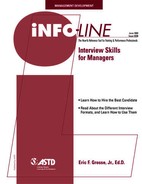Interviewing Skills
Managers who have little or no experience conducting interviews often believe their chances of hiring the best candidate for a job are about as good as throwing double sixes on a single toss of the dice.
There are ways, however, to turn the apparent obstacles into opportunities to hire or promote excellent talent. By carefully selecting and properly using one or more interviewing techniques, any manager can lay the groundwork for a successful new hire or promotion.
Whether determining the suitability of a job applicant for an open position or deciding whom to promote, there are three questions a manager conducting the interview should ask before summoning the first candidate:
What will make a candidate suitable for this job?
What are the signals that a candidate may be appropriate for this job?
What are the signals that a candidate may not be appropriate for this job?
By answering the first question ahead of time, it becomes possible to answer the other two during the interview. The key to answering the first question lies in understanding your organization's core culture—what it does and does not value, where it wants to go, and how it plans to get there—and then applying those insights to the interviewing process.
Once you answer the first question, you must choose the type of interview to conduct. There are seven types of interviews:
Patterned interviews.
Semi-structured interviews.
Nondirective interviews.
Stress interviews.
Group interviews.
Board or panel interviews.
Behavioral event interviews.
In addition, there is an interview format that should be followed when an employee leaves an organization. If properly handled, exit interviews can provide a wealth of information about what's not working well in an organization.
This issue of Info-line explores the art and science of interviewing, with a focus on how different interview formats work. This issue also will discuss interviewing as part of the career advising process, as many promotion decisions arise from career advising. Case studies, interviews, checklists, and a job aid are provided to complete the process of turning a “toss of the dice” into a well-conceived and executed managerial decision.
